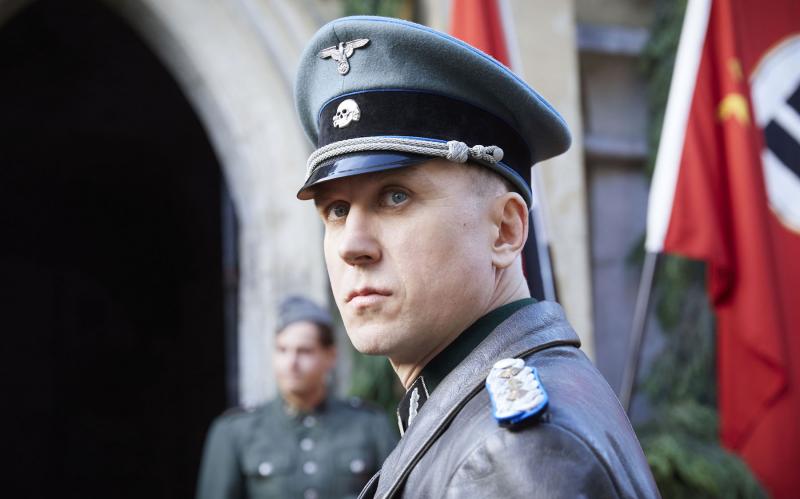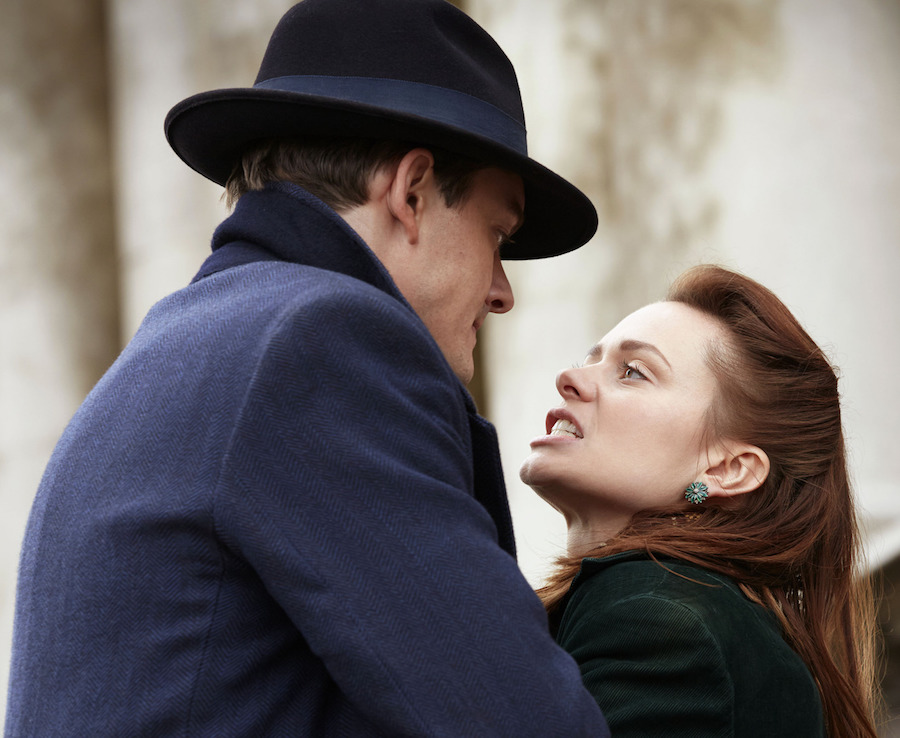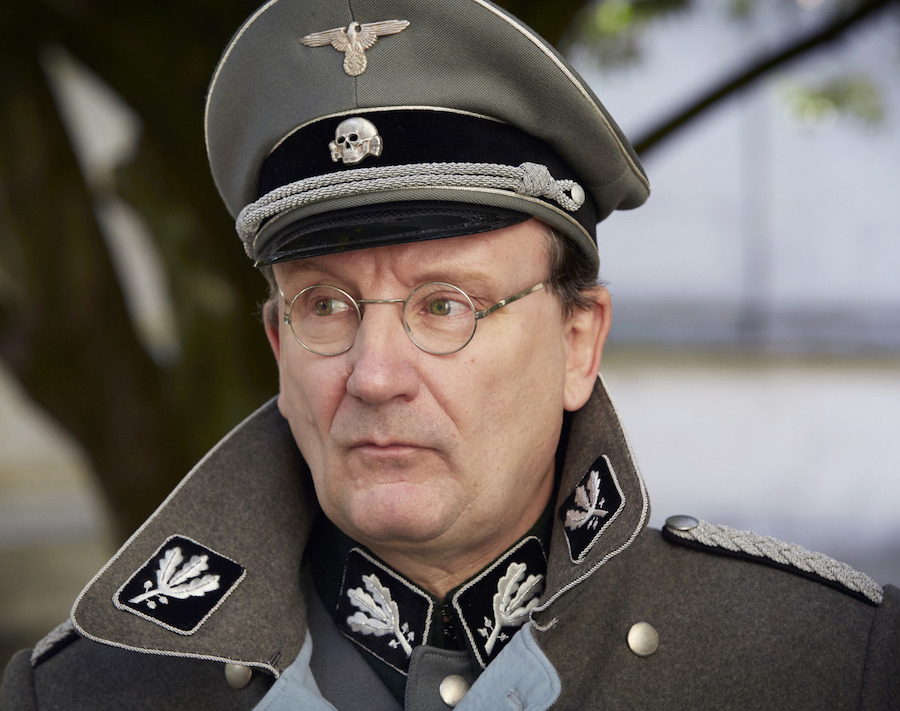SS–GB, Series Finale, BBC One | reviews, news & interviews
SS–GB, Series Finale, BBC One
SS–GB, Series Finale, BBC One
It was the Germans wot won it

In the end, SS-GB promised more than it could deliver, but it still left us with some memorable images (not least in the cleverly-crafted opening titles) and several excellent performances. The ending even dangled the faintest hint of a sequel, though presumably not one written by the author of the original book, Len Deighton.
What this dramatisation did best was to plant chilling glimpses of what it might have been like to be occupied by the Third Reich, and it did so without resorting too much to the familiar cliches of the way Nazism is usually portrayed. Beatings and torture were used more as a queasy, lingering threat than a parade of in-your-face horrors – indeed, having the glamorous American journalist Barbara Barga (Kate Bosworth) looking terrified at the prospect of being about to be tortured was probably more effective than actually carrying it out. Also, the writers were shrewd enough to recognise that the Reich’s obsessions with Jews and assorted untermensch could be exploited with just a glimpse of a yellow star pinned to somebody’s coat, or a mention of how the occupying authorities were trawling through police files to weed out “undesirables”.
 However, as the story developed, it began to suffer from looking under-resourced, and simply lacked enough props and trappings to carry the story it was trying to tell. The notion that the German army and the SS viewed each other as far greater enemies than the British, the French or Hitler’s new pals the Russians was historically quite plausible, but this final episode’s depiction of an attempt to spirit the ailing George VI (a thankless role for a quasi-moribund Jonathan Cullen) out of the country under cover of a clandestine American attack was like being told the story by being passed a series of hastily-scribbled sketches, leaving you to imagine the details.
However, as the story developed, it began to suffer from looking under-resourced, and simply lacked enough props and trappings to carry the story it was trying to tell. The notion that the German army and the SS viewed each other as far greater enemies than the British, the French or Hitler’s new pals the Russians was historically quite plausible, but this final episode’s depiction of an attempt to spirit the ailing George VI (a thankless role for a quasi-moribund Jonathan Cullen) out of the country under cover of a clandestine American attack was like being told the story by being passed a series of hastily-scribbled sketches, leaving you to imagine the details.
Our heroes, led by Douglas “Archer of the Yard” Archer (Sam Riley, pictured above with Maeve Dermody), were somehow able to drive freely across the country without ever bumping into a German patrol (though they did meet some treacherous collaborators), even as they drew near to a top-secret scientific research establishment. In addition, nobody bothered to explain how American ships could simply sail up to the English coast without the Germans noticing.
 Meanwhile, acting-wise, it was the Germans wot won it. Rainer Bock was immaculate as Gruppenführer Kellermann (left), seemingly a vain, bumbling old fool but in fact a ruthless and consummate tactician, playing the Reich’s internal political games with lethal skill (it was no coincidence that he was a keen fly fisherman). Splendid, too, was Lars Eidinger as SS officer Oskar Huth, whose chilling arrogance was gradually peeled away to reveal a cultivated, perceptive man capable of displays of decency. Even though he worked closely with Heinrich Himmler.
Meanwhile, acting-wise, it was the Germans wot won it. Rainer Bock was immaculate as Gruppenführer Kellermann (left), seemingly a vain, bumbling old fool but in fact a ruthless and consummate tactician, playing the Reich’s internal political games with lethal skill (it was no coincidence that he was a keen fly fisherman). Splendid, too, was Lars Eidinger as SS officer Oskar Huth, whose chilling arrogance was gradually peeled away to reveal a cultivated, perceptive man capable of displays of decency. Even though he worked closely with Heinrich Himmler.
Oh, and regarding the “Mumblegate II” saga, it seemed to me that Sam Riley’s dialogue was far more clearly audible on iPlayer than it was on the telly. It was a shame his hat was two sizes too large, though.
The future of Arts Journalism
You can stop theartsdesk.com closing!
We urgently need financing to survive. Our fundraising drive has thus far raised £49,000 but we need to reach £100,000 or we will be forced to close. Please contribute here: https://gofund.me/c3f6033d
And if you can forward this information to anyone who might assist, we’d be grateful.

Subscribe to theartsdesk.com
Thank you for continuing to read our work on theartsdesk.com. For unlimited access to every article in its entirety, including our archive of more than 15,000 pieces, we're asking for £5 per month or £40 per year. We feel it's a very good deal, and hope you do too.
To take a subscription now simply click here.
And if you're looking for that extra gift for a friend or family member, why not treat them to a theartsdesk.com gift subscription?
more TV
 Murder Before Evensong, Acorn TV review - death comes to the picturesque village of Champton
The Rev Richard Coles's sleuthing cleric hits the screen
Murder Before Evensong, Acorn TV review - death comes to the picturesque village of Champton
The Rev Richard Coles's sleuthing cleric hits the screen
 Black Rabbit, Netflix review - grime and punishment in New York City
Jude Law and Jason Bateman tread the thin line between love and hate
Black Rabbit, Netflix review - grime and punishment in New York City
Jude Law and Jason Bateman tread the thin line between love and hate
 The Hack, ITV review - plodding anatomy of twin UK scandals
Jack Thorne's skill can't disguise the bagginess of his double-headed material
The Hack, ITV review - plodding anatomy of twin UK scandals
Jack Thorne's skill can't disguise the bagginess of his double-headed material
 Slow Horses, Series 5, Apple TV+ review - terror, trauma and impeccable comic timing
Jackson Lamb's band of MI5 misfits continues to fascinate and amuse
Slow Horses, Series 5, Apple TV+ review - terror, trauma and impeccable comic timing
Jackson Lamb's band of MI5 misfits continues to fascinate and amuse
 Coldwater, ITV1 review - horror and black comedy in the Highlands
Superb cast lights up David Ireland's cunning thriller
Coldwater, ITV1 review - horror and black comedy in the Highlands
Superb cast lights up David Ireland's cunning thriller
 Blu-ray: The Sweeney - Series One
Influential and entertaining 1970s police drama, handsomely restored
Blu-ray: The Sweeney - Series One
Influential and entertaining 1970s police drama, handsomely restored
 I Fought the Law, ITVX review - how an 800-year-old law was challenged and changed
Sheridan Smith's raw performance dominates ITV's new docudrama about injustice
I Fought the Law, ITVX review - how an 800-year-old law was challenged and changed
Sheridan Smith's raw performance dominates ITV's new docudrama about injustice
 The Paper, Sky Max review - a spinoff of the US Office worth waiting 20 years for
Perfectly judged recycling of the original's key elements, with a star turn at its heart
The Paper, Sky Max review - a spinoff of the US Office worth waiting 20 years for
Perfectly judged recycling of the original's key elements, with a star turn at its heart
 The Guest, BBC One review - be careful what you wish for
A terrific Eve Myles stars in addictive Welsh mystery
The Guest, BBC One review - be careful what you wish for
A terrific Eve Myles stars in addictive Welsh mystery
 theartsdesk Q&A: Suranne Jones on 'Hostage', power pants and politics
The star and producer talks about taking on the role of Prime Minister, wearing high heels and living in the public eye
theartsdesk Q&A: Suranne Jones on 'Hostage', power pants and politics
The star and producer talks about taking on the role of Prime Minister, wearing high heels and living in the public eye
 King & Conqueror, BBC One review - not many kicks in 1066
Turgid medieval drama leaves viewers in the dark
King & Conqueror, BBC One review - not many kicks in 1066
Turgid medieval drama leaves viewers in the dark
 Hostage, Netflix review - entente not-too-cordiale
Suranne Jones and Julie Delpy cross swords in confused political drama
Hostage, Netflix review - entente not-too-cordiale
Suranne Jones and Julie Delpy cross swords in confused political drama

Add comment